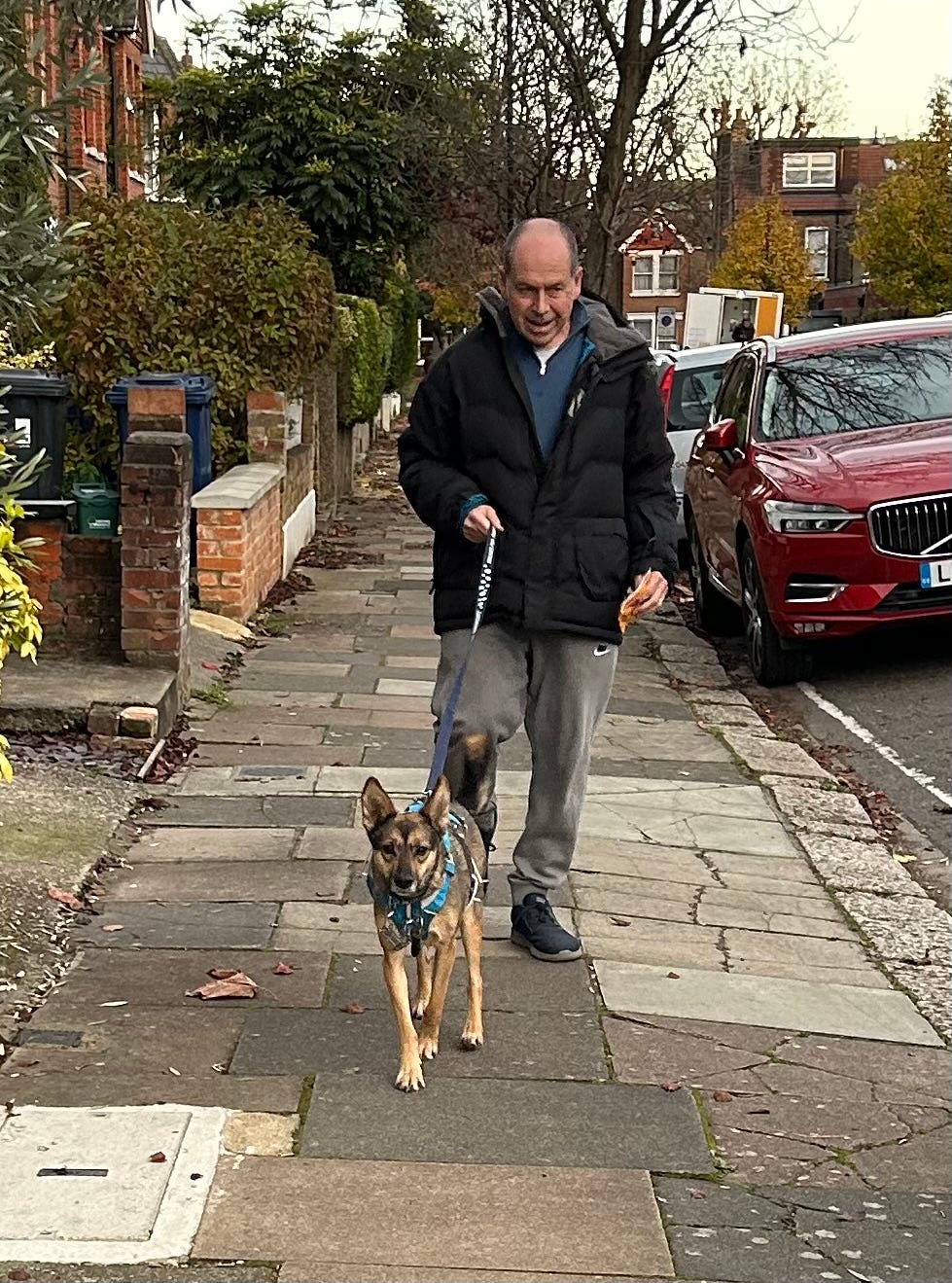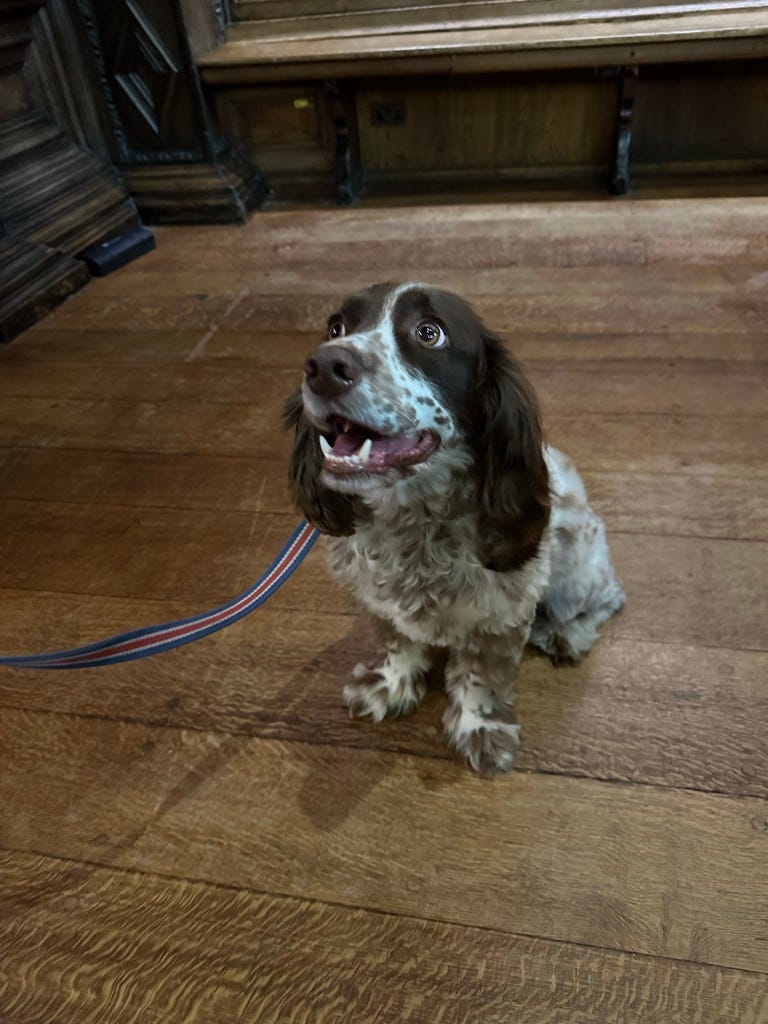Movers and Shakers: Pets and Parkinson's
Sophie, Bilbo, Derek and Lana Del Grey - are they good for our health?
Listeners to this week’s episode of Movers and Shakers may smell a rat. So, I hear them say, you happen to be doing a podcast about the role pets can play in improving life with Parkinson’s just as one of you is promoting a book about his rescue dog? It’s a fair cop. I have been preoccupied for the last weeks with talking about my book Sophie from Romania
.But the episode was not my idea - my colleagues were convinced that it would make a good listen, and I think they were right. My book, as well as chronicling our first year with a dog so terrified that she spent most of her first six months with us cowering behind our sofa, is also an account of my worsening Parkinson’s symptoms and of the launch of Movers and Shakers.
“Not another puff for this bloody book,” says the magnificently grumpy Jeremy Paxman at the start. But we then learn what a big part his rescue dog Derek, a springer spaniel acquired from Battersea Dogs’ Home before his Parkinson’s diagnosis, has played in his life.
“Well, apart from being someone to share a Scotch egg with, he's also a focus for affection. I love this dog, and I wouldn't have it any other way.”
Derek, who seems the calmest and most amiable of dogs, has turned up at a number of Movers and Shakers recordings but could not be with us this time due to a prior appointment with doggy daycare. But Nick “the judge” Mostyn’s miniature dachshund Bilbo was with us once more, sitting contentedly in his owner’s arms and listening to our conversation.
As ever, the judge has a string of legal anecdotes about Bilbo, including the occasion when he escaped Sir Nicholas’s chambers in the Royal Courts of Justice, ate one judge’s lunch and took a dump in the middle of another’s courtroom during a recess. Then there was the time he took Bilbo on the regional circuit and the tiny dog accompanied him to court: “The courtroom was packed, and everybody was standing up, and Bilbo started barking. I said ‘Sit!!’ and everybody in the courtroom sat down.”
He then paints a picture of the traits of miniature dachshunds: “They have strong personalities, these little dachshunds, and they're rather contrary, but they are very, very affectionate.” Well, they say dogs do come to resemble their owners.
Over the course of the episode we hear interviews with three Parkies about the importance of their pets. Anna Jewell said she had always wanted to get a dog as a family pet but when she was diagnosed with Parkinson’s feared that might now be impossible. But her husband read that dogs could be good for people with Parkinson’s and. so it has proved since they got a labrador called Brody: “He's just helpful in terms of both ensuring that I get out and exercise regularly, but also just for mental health as well. Dogs are just such a wonderful kind of calming presence to have around the house.”
For Matthew Sullivan it is cats that have proved good for his health: “They don't mind when your dyskinesia is in full force. For your mood, there's lots of laughing at what they get up to. And you have to get up out of your chair and move around the house to get treats and play with the cats.”
Fiona Satiro says her family ‘s dog Chewy had arrived some years before her Parkinson's diagnosis, but has since played a big role in her physical and mental health, especially when she was being treated for bowel cancer earlier this year:
“She was part of my recuperation from that as well. Yes, she fulfils many roles around the house, in terms of the humans, keeping us all happy and healthy.
We have two guests in the pub with us, each well placed to talk about the relationship between dogs and humans with a degenerative disease. Si Wooler is the behaviourist who got in touch with me and my wife just days after Sophie arrived in our home and has been advising us ever since. Kris Glover runs the behavioural team at Dogs Trust, the UK’s biggest rescue charity.
From the moment I started talking on social media about Sophie and her extreme fearfulness, some people have wondered whether my Parkinson’s was a factor, making her more scared of me than of my wife Diane. But Si is not so sure that my condition had much of an impact on my relationship with our dog
“It’s important, I think, to remember as well that Sophie was fearful before she arrived,” he points out. “It wasn't because of Rory’s Parkinson's that she became fearful of nearly everything in her world.”
And, when cross-examined by the judge on whether dogs can help people with Parkinson’s dealing with depression, Si suggests that there is a possibility that Sophie is having a positive impact on my health:
“The latest research suggests that actually the connection that you make with your dog……has certain effects on the brain, one of which is the production of oxytocin, which then produces dopamine, or aids in the production of dopamine and serotonin.”
I know from my experience how carefully rescue organisations like Dogs Trust vet potential adopters but we wanted to know from Kris Glover whether people with a long-term condition like Parkinson’s might be discouraged from adopting particular dogs:
“What we very much try to do at Dogs Trust is just understand what the owner and the family and the home requirements are,” she says. “With some chronic health conditions, we know stress can make those conditions worse. So it's really, really important that whatever pet we take on, not only is the welfare of the pet really important, and obviously the happiness of the pet, but also the welfare, the care needs and the happiness of the owner.”
Kris is pressed by Mark Mardell (owner by the way of two cats, Lana del Grey and Captain Faye Jenkins) on whether they ever have to tell someone in poor health that they just can’t have a dog: “I think there's always the right dog out there for the right home, and I think there's a right home out there for the right dog,” she insists.
Nick Mostyn remembers some advice he got from a senior judge about dealing with people who are mentally incapacitated: “He said the local authority will always want to take the person's dog away because it's too much of a bore to look after the dog. Don't let them do it. It's the really most important thing for keeping incapacitated people calm and stable.”
By now, Jeremy Paxman has warmed to the whole idea of an episode about pets, and he is looking for some practical advice. Derek, it seems, gets very excited whenever he sees a dog on the television and starts barking furiously - what can be done to stop him? Si Wooler, who has tackled far more tricky canine conundrums than this, leaps into action and provides Jeremy with a full training programme to turn Derek into a calmer TV viewer. So, what’s the secret? You will have to listen to the podcast to find out.





I thoroughly enjoyed the podcast about dogs. My dog, Hashtag named after the football club my son owns Hashtag United, was a huge help during the 7 weeks bed rest following my breaking my foot in three places. He saved me from my depression and now saves many when we visit care homes and hospitals as a Pets at Therapy Dog. The visits are also good at getting me up and out and doing something rewarding. People love a cuddle with him and he loves the biscuits they drop for him. I should change his name to Dyson as he cleans up really well 😀